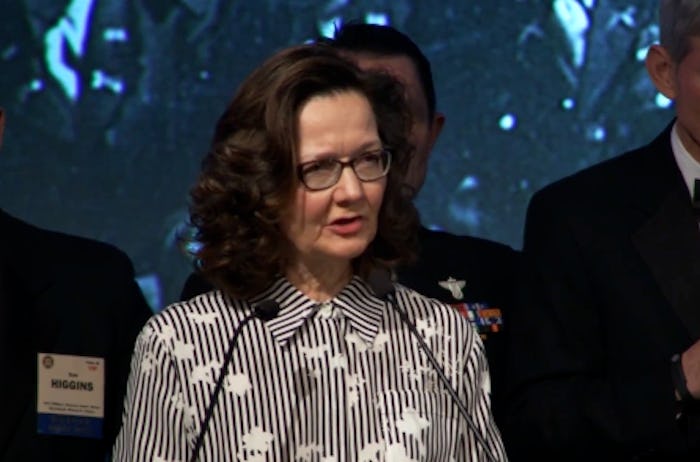News
Gina Haspel Could Be The First Female CIA Director, But Here's Why Not Everyone Is Happy About It
There's been another staff shake-up at the White House. On Tuesday morning, President Donald Trump announced that Rex Tillerson is out as Secretary of State, and Mike Pompeo — director of the CIA — is in. That means the Central Intelligence Agency needs a new leader, provided everything works out and Pompeo is confirmed in his new role. President Trump announced — via tweet, of course — that Gina Haspel "will become the new Director of the CIA." But who is Gina Haspel? Not everyone is thrilled with her nomination, historic as it may be.
The appointment of CIA Director Mike Pompeo as the new secretary of state is "likely," according to CNBC. Gina Haspel is currently the deputy CIA director and would succeed Pompeo, making her the first woman to lead the agency, The Chicago Tribune reported. And on the surface, that seems like a historic move that's been a long time coming.
But Haspel's past as a "career spymaster" is being called into question, specifically her work running a CIA prison in Thailand where terror suspects were reportedly waterboarded, according to CBS News. She also aided in carrying out an order that the CIA destroy its waterboarding videos, muddling her past further and worrying some opponents about her intentions with the interrogation and detention program should she lead the CIA.
Haspel was a senior official overseeing a top-secret CIA program from 2003 to 2005, according to The New Yorker. In that program, suspected terrorists were subjected to "savage interrogations," including sleep deprivation, being squeezed into coffins, and having water forced down their throats, the outlet reported. And just a year earlier, in 2002, Haspel was present with other CIA officers at the interrogation of Abu Zubaydah, an Al Qaeda terrorist suspect "who was tortured so brutally that at one point he appeared to be dead," according to The New Yorker. Tapes of the sessions where Abu Zabaydah was reportedly waterboarded 83 times were destroyed in 2005 under Haspel's orders, according to NPR.
Although we don't know all the particulars about Haspel's role in those interrogations, Haspel's new job will require congressional confirmation, and she may have to publicly answer some questions about those events in her past with the agency.
These questions about Haspel's past aren't new, either. Oregon Sen. Ron Wyden and New Mexico Sen. Martin Heinrich, both members of the Intelligence Committee, wrote to the president on Feb. 2, 2017 — when Haspel's role as the CIA's deputy director was announced — and stated that "her background makes her unsuitable for the position," NPR reported. Now, she's poised to take on an even more influential role at the agency with more power over the United States' counterterrorism efforts.
To be fair, others have also praised Haspel's work in the past. For instance, in 2017, James Clapper — the former Director of National Intelligence under President Barack Obama — said he was “very pleased” Haspel was chosen to be deputy director, and former CIA Director Michael Hayden complimented Haspel's “dignity, professionalism, and honor," according to TIME.
Haspel is 61 years old, and has worked for the CIA since 1985, according to WSB Radio. She's also served as chief of staff for the director of the National Clandestine Service, but was notably not confirmed to lead the unit after senators questioned her actions in the Rendition, Detention and Interrogation program for the CIA, the outlet reported. Though she is well-respected in the intelligence community, and has won awards for her service, many are still wary about whether she's the right choice to be director of the CIA, given her somewhat shady past.
The truth is, nominating a woman to this role isn't necessarily a feminist victory in and of itself. It has to be the right nominee, and many people feel that Haspel's past makes her the wrong choice for the position. It will be interesting to watch how she is questioned during confirmation hearings, and whether she can get the votes necessary to become a historic, but controversial, addition to the Trump administration.
